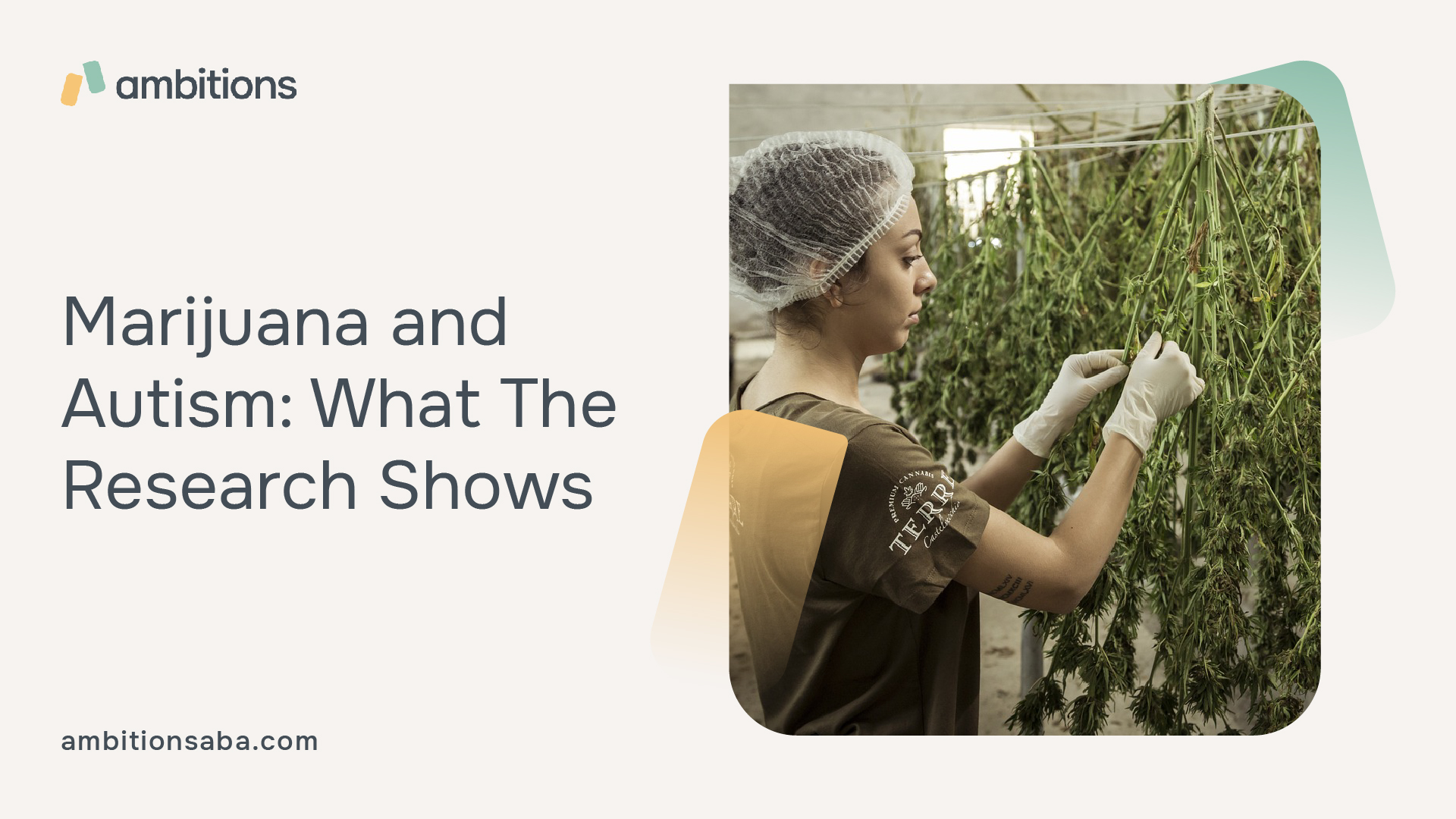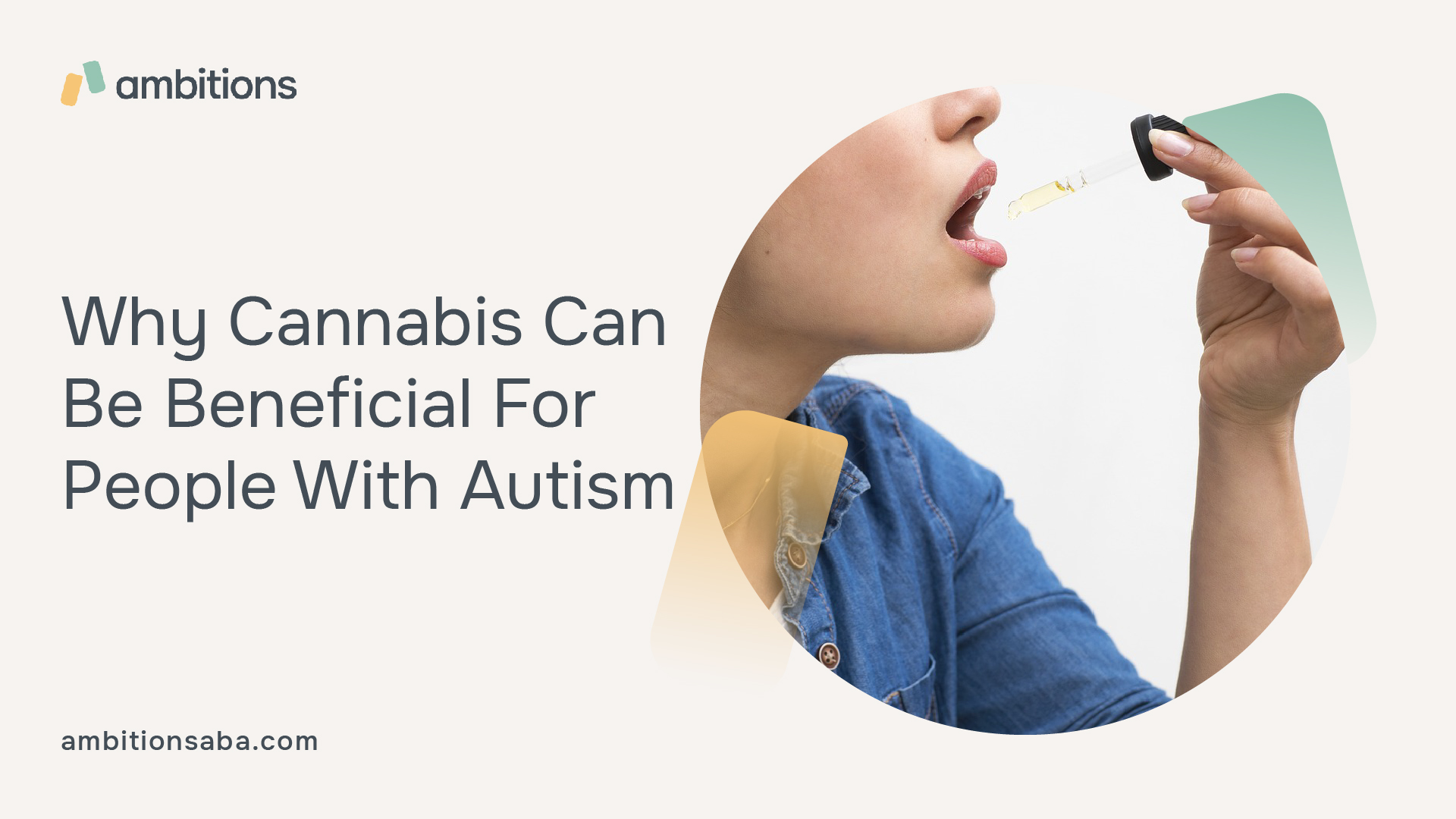Unlocking Social Understanding Through ABA Therapy

Marijuana and its potential effects on people with autism is a topic that has gained a lot of attention in recent years.
While some studies have suggested that marijuana use may help alleviate certain symptoms of autism, others have raised concerns about its potential negative impacts.
Autism, or autism spectrum disorder (ASD), is a neurodevelopmental disorder that affects communication, social interaction, and behavior.
It is a complex disorder that can manifest in a variety of ways, with symptoms ranging from mild to severe. Some of the common symptoms of autism include difficulty with social interactions, repetitive behaviors, and difficulty with verbal and nonverbal communication.
What The Research Shows About Marijuana and Autism
Now, let's look at the research on marijuana and autism. Some studies have suggested that marijuana use may help alleviate certain symptoms of autism.
For example, a study published in the Journal of Autism and Developmental Disorders in 2019 found that children with autism who were treated with medical cannabis experienced significant improvements in their symptoms, including hyperactivity, irritability, and anxiety.
Another study published in the same journal in 2018 found that adults with autism who used medical cannabis reported improvements in their quality of life and reductions in their symptoms.
However, these studies are relatively small and more research is needed to fully understand the potential benefits of marijuana use for people with autism.
Additionally, there are concerns about the potential negative impacts of marijuana use, particularly in young children.
The American Academy of Pediatrics has stated that "the use of marijuana in children with autism spectrum disorder is not supported by any scientific evidence and could be harmful."
One potential concern is the impact of marijuana use on the developing brain. Studies have shown that marijuana use can have negative effects on brain development, particularly in young people.
This is a concern because autism is typically diagnosed in early childhood, when the brain is still developing. Additionally, some studies have suggested that marijuana use during pregnancy may increase the risk of autism in children.
Another concern is the potential for marijuana use to exacerbate certain symptoms of autism. For example, marijuana use can cause anxiety and paranoia, which may worsen symptoms in people with autism who already struggle with anxiety and social interactions.
In conclusion, while some studies have suggested that marijuana use may help alleviate certain symptoms of autism, more research is needed to fully understand the potential benefits and risks.
Additionally, there are concerns about the impact of marijuana use on the developing brain and the potential for it to exacerbate certain symptoms of autism.
Why Cannabis Can Be Beneficial For People With Autism

Recent studies have shown that cannabis can be beneficial for people with autism. Cannabis contains compounds called cannabinoids, which interact with the body's endocannabinoid system to produce a variety of effects.
One of the main cannabinoids found in cannabis is cannabidiol (CBD), which has been shown to have anti-inflammatory, analgesic, and antipsychotic properties. These properties make CBD a promising treatment option for people with autism who experience inflammation, pain, and behavioral issues.
In addition to CBD, another cannabinoid found in cannabis is tetrahydrocannabinol (THC). THC is known for its psychoactive effects and is responsible for the "high" associated with marijuana use.
While THC can cause side effects such as anxiety and paranoia, it also has potential therapeutic benefits.
Research has shown that THC may help alleviate certain symptoms of autism, such as repetitive behaviors and hyperactivity. Additionally, some studies suggest that THC may help improve social interactions in people with autism.
The optimal cannabinoid ratio for treating autism symptoms is not yet clear. More research is needed to determine the ideal ratio of CBD to THC for treating specific symptoms of autism.
Overall, while more research is needed to fully understand the potential benefits and risks of using cannabis as a treatment option for people with autism, recent studies have shown promising results.
When You Shouldn't Use Cannabis For Autism

There are certain scenarios where cannabis should not be used as a treatment option for people with autism. For example, individuals who have a history of substance abuse or addiction may be at an increased risk of developing problematic cannabis use.
Additionally, the use of cannabis in young children is not recommended due to concerns about the potential negative impact on brain development. Pregnant women should also avoid using cannabis as it may increase the risk of autism in their children.
Moreover, the use of cannabis may interact with other medications that are being taken by individuals with autism, potentially causing harmful side effects. It's important to consult with a healthcare professional before using cannabis as a treatment option for autism.
Cannabis and autism, explained
Cannabis and autism have been a topic of discussion in recent years, but what exactly is cannabis, and how does it affect people with autism? Cannabis refers to a group of plants that contain compounds called cannabinoids. The most well-known cannabinoid is tetrahydrocannabinol (THC), which is responsible for the psychoactive effects of marijuana.
In contrast, cannabidiol (CBD) is another cannabinoid that has gained attention for its potential therapeutic benefits without causing the "high" associated with THC. CBD is available in many forms including oils, edibles, and capsules.
When it comes to autism, research has shown that the endocannabinoid system (ECS) plays a role in regulating behavior and mood.
The ECS consists of receptors located throughout the body that interact with cannabinoids like THC and CBD to regulate various physiological processes.
Some researchers believe that targeting the ECS with cannabinoids like CBD could help alleviate symptoms of autism by modulating brain activity and reducing inflammation. However, more research is needed to fully understand the potential benefits and risks of using cannabis as a treatment for autism.
It's important to note that not all cannabis products are created equal. The potency and quality of cannabis products can vary widely depending on factors like where they were grown, how they were processed, and whether or not they were tested for contaminants.
For people considering using cannabis as a treatment for autism or other conditions, it's important to work closely with a healthcare professional who can provide guidance on safe dosing and monitoring for any potential side effects or interactions with other medications.
If you or a loved one is considering using medical cannabis to treat autism, it's important to consult with a healthcare professional who is knowledgeable about the potential risks and benefits.
FAQs
How does marijuana affect people with autism?
While some studies have suggested that marijuana use may help alleviate certain symptoms of autism, others have raised concerns about its potential negative impacts. The effects of marijuana on people with autism can vary depending on the individual and the specific symptoms they are experiencing.
Is it safe for children with autism to use medical cannabis?
The American Academy of Pediatrics has stated that "the use of marijuana in children with autism spectrum disorder is not supported by any scientific evidence and could be harmful." There are concerns about the potential negative impacts of marijuana use, particularly in young children whose brains are still developing.
What are the potential benefits of using medical cannabis for people with autism?
Some studies have suggested that medical cannabis may help alleviate certain symptoms of autism, including hyperactivity, irritability, anxiety, and sleep disturbances. However, more research is needed to fully understand the potential benefits and risks.
What are the potential risks of using medical cannabis for people with autism?
There are concerns about the impact of marijuana use on brain development, particularly in young people. Additionally, some studies have suggested that marijuana use during pregnancy may increase the risk of autism in children. Marijuana use can also cause anxiety and paranoia, which may worsen symptoms in people with autism who already struggle with these issues.
Are there any alternatives to medical cannabis for treating symptoms of autism?
There are a variety of treatments available for managing symptoms of autism, including behavioral therapy, medication (such as antidepressants or antipsychotics), and dietary interventions. It's important to work with a healthcare professional to determine the best course of treatment for each individual case.

